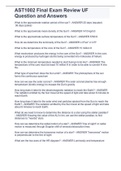Exam (elaborations)
AST1002 Final Exam Review UF Question and Answers
- Course
- Institution
What is the approximate rotation period of the sun? - ANSWER 25 days (equator) 36 days (poles) What is the approximate mean density of the Sun? - ANSWER 1410 kg/m3 What is the approximate surface temperature of the Sun? - ANSWER 5780 K How do we determine the luminosity of the Sun? - ANS...
[Show more]



